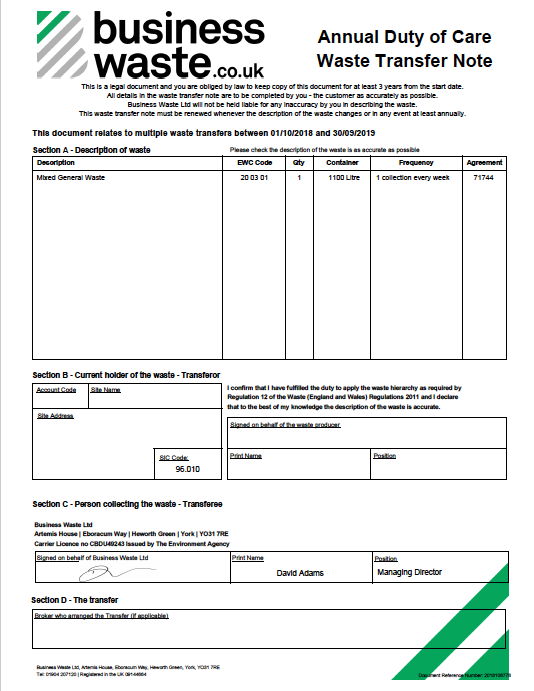Waste Transfer Note – Example and FAQs
What is a waste transfer note?
A waste transfer note (WTN) is a legally required piece of documentation that must be completed when waste changes hands. This means if a business needs waste disposing of or collecting by a waste disposal company and it’s passed over to another business, perhaps for recycling or processing, a WTN must be completed.
The only notable exception is when a householder initially parts with waste. In those circumstances, a WTN is not required for the waste to be removed. However, if it’s passed on, then a WTN will be required. WTNs can cover either a single transaction or a number of similar transactions (a “season” WTN).
Why do I need a waste transfer note?
Waste needs to be disposed of legally and correctly – and completing a waste transfer notice is a legal requirement. To achieve this, it’s essential that there’s a clear audit trail showing what type of waste has been transferred and what happened to it when it was transferred between owners (if anything).
If the waste is hazardous, waste consignment notes help ensure the safety of the employees working with it as it’s moved through the waste disposal process.
What are the different types of waste transfer notes?
Non-hazardous waste is covered by a generic duty of care waste transfer note. This contains details of the waste producer and waste receiver, as well as information regarding the type and volume of waste.
If you some or all of the waste is hazardous, you must complete a hazardous waste consignment note. This enables those handling, managing, and disposing of the waste to do so safely and appropriately. Broadly speaking, hazardous waste is any type of waste dangerous to humans or to the environment.
Common types of hazardous waste that require a consignment note can include batteries, asbestos, solvents, paints, brake fluids, fridges, pesticides, and oils. These types of waste must be dealt with professionally.
A separate type of WTN – a Vehicle Purchase Receipt – is required if a vehicle is sold for waste.
What is a waste consignment note?
A waste consignment note is a piece of documentation that needs completing every time hazardous waste is moved, regardless of a transfer in ownership. In comparison, a waste transfer note is completed when waste changes hands. Non-hazardous waste doesn’t require the completion of a waste consignment note.
Hazardous waste consignment notes are part of a system of audit information that shows how a company stores, manages, and moves the hazardous waste in its possession. Companies owning hazardous waste are legally required to show how they are managing it appropriately – a waste consignment note is part of this process.
How much does a duty of care waste transfer note cost?
There’s no formally levied charge for completing a WTN or a waste consignment note. WTNs can be completed by your waste carrier for free, by simply using a generic waste transfer note template – see the example below. If a company attempts to charge you a fee for filling in a WTN, be suspicious!
There’s no reason why a charge should be applied. It could be that a business is attempting to extract cash from you for a piece of paperwork that should be completed at no additional cost, as part of the waste transfer transaction. At Business Waste we provide all our customers with their duty of care waste transfer note for free.
Do I need a waste transfer note?
Yes, a waste transfer note is needed as it’s legally required when passing on your commercial waste to another party – except where a householder is parting with waste. If in doubt, fill in a WTN. Companies have been prosecuted and fined in the past for failure to complete a WTN when required to do so by law. Why take the risk?
How long do we need to keep waste transfer notes for?
WTNs should be kept for audit purposes for at least two years. Remember that the relevant information can be stored online if paper storage is likely to prove too onerous. Where possible it’s best to extend the waste transfer note retention period, just to be safe.
How long should waste consignment notes be kept?
Waste consignment notes should be kept for at least three years. In the same way as WTNs, waste consignment notes can be stored online as well as in paper form.
What is a waste transfer licence?
A waste transfer licence is required by any company that transports waste as part of their business. You do not need to produce or own the waste, but if you move it to a recycling facility or landfill site, you must have a waste transfer licence. At Business Waste, all the drivers we work with are licensed waste carriers.
Waste transfer note template
Meet your duty of care with the below waste transfer note example. Use this waste transfer note template for an example of what needs including to ensure your rubbish is removed safely and legally.
Learn more about waste transfer notes

Have your waste collected
Get a fast FREE quote for your waste collection 0800 211 83 90
- Free quote within 1 hr
- Any type of waste
- FREE bins and delivery
- We cover all of the UK